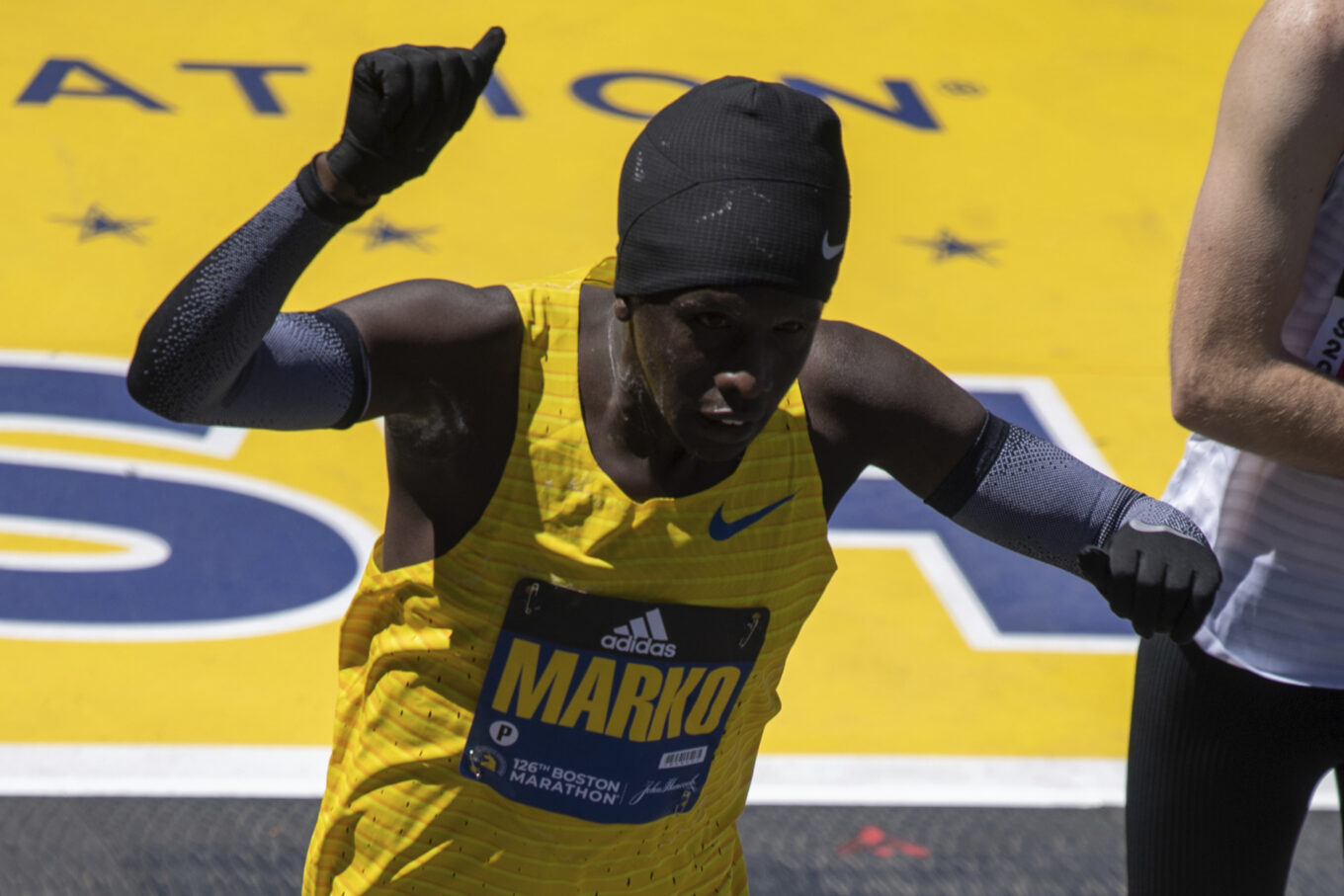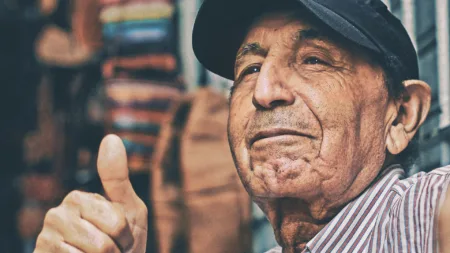BOSTON, MA - APRIL 18: Marko Cheseto Lemtukei, of the United States of America, a double amputee, crosses the finish line in first place in the men's Lower Limb Impairment division of the Boston Marathon on April 18, 2022 on Boylston Street in Boston, MA. Cheseto Lemtukei finished with a time of 2:37:01. (Photo by Erica Denhoff/Icon Sportswire) (Icon Sportswire via AP Images)
“It’s my feet that brought me to America, and then all of a sudden, I don’t have them. But then as I was recovering, I told myself, am I really going to let this define who I am? Because I know our power is not outside us. It’s in us,” said Marko Cheseto Lemtukei right after crossing the finish line at the Boston Marathon. [[1]]
Lemtukei was in the group of first-place finishers in the para-athletic divisions of the Boston Marathon. He is a double amputee, but that didn’t stop him from finishing the marathon in a little over two-and-a-half hours. The second-place finisher in his division crossed the finish line over 30 minutes after him. [[2]]
This year was the second Boston Marathon where para-athletes with lower limb, upper limb, or visual impairments could compete in their own separate divisions for awards and prizes.
“Even if your body and mind are not agreeing together, you can at least use one. You can either use your mind to push you or use your body to push you.”
Lemtukei Lost Both Feet to Frostbite
Lemtukei was born in Kenya. He received an opportunity to study at the University of Alaska-Anchorage, where he found himself alone, lost, and cold in 2011.
He stumbled into the Alaska rural country on a frigid day in an emotional haze. His cousin had committed suicide earlier that year, and the two were also teammates on the cross-country team. Lemtukei felt guilty because he was the one who had convinced his cousin to come to the United States to pursue a better life.
Lemtukei couldn’t quiet his mind. Weighed down by guilt, the symptoms of depression started worsening. In less than eight weeks, he decided to try to follow the path of his cousin and friend by swallowing an entire bottle of pills. He was found, rushed to the hospital, and survived – but not after spending a month in the facility’s mental health ward. [[3]]
Although he was eventually released, the inner turmoil wouldn’t go away. Lemtukei let people see on the outside that it seemed like things were getting better, but it was a different conversation on the inside.
On November 6, 2011, he took a handful of antidepressants, wandered into the woods, and was ready to let life go. Lemtukei found a spot he liked, took the pills, and drifted away. Rescue teams spent two days trying to find him, but there were no signs. They called off the effort. [[4]]
Just hours later, Lemtukei stumbled into the hotel lobby on campus and collapsed to the floor. His shoes were affixed to his feet, his body frozen, and horrific frostbite on his extremities.
After no improvement with treatment over the next week, doctors had no choice but to amputate both legs six inches below the knee.
A Single Event Doesn’t Define the Person You Are
At the 2022 Boston Marathon, Lemtukei thinks about that fateful day when he thought the end of his story had been written.
“It’s my feet that brought me to America, and then all of a sudden, a don’t have them,” he said. “As I was recovering, I told myself, am I really going to let this define who I am? I know our power is not outside us. It’s in us – I still felt like I was the miracle that I knew.”
That’s when Lemtukei knew that he had a purpose. There were kids out there like him, without feet, facing numerous challenges in life. They were probably asking themselves what they were going to do, just like he was after this happened. [[5]]
He could serve as a role model for people in that situation. “Our limitations are our thoughts,” said Lemtukei. “I want them to know that the limitations that we think are out there sometimes not true.”
Only three weeks after his surgery, Lemtukei was fitted with his first walking prosthetics. Less than five months later, he participated in a 5K run in Anchorage. It would take another year, however, along with a donation of running blades, for him to start feeling like he was really back.
Just 14 months later, in February 2013, Lemtukei rejoined his cross-country team to have a run around the track.
Lemtukei currently holds the world record for a double amputee, setting the time at 2:37.23 in the Chicago Marathon – a time he almost beat at this year’s Boston Marathon. [[6]]
References:
[[1]] https://www.boston.com/sports/boston-marathon/2022/04/22/boston-marathon-2022-double-amputee-marko-cheseto-lemtukei-inspirational-message/; [[2]]https://www.ossur.com/en-us/team-ossur/marko-cheseto-lemtukei; [[3]] https://www.espn.com/olympics/story/_/id/28779274/marko-cheseto-double-leg-amputee-found-new-life-running; [[4]] https://www.orlandosentinel.com/sports/os-sp-alaska-runner-feet-amputated-1209-story.html; [[5]]https://www.theguardian.com/sport/2021/oct/07/marko-cheseto-survived-grief-frostbite-and-amputation-to-run-the-boston-marathon; [[6]]https://globalsportmatters.com/health/2019/10/31/marko-cheseto-quietly-rewriting-para-athlete-record-book/













Comments are closed.